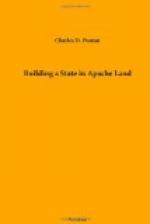At this time there was not an inhabitant on Salt River where Phoenix now stands, and the Salt River Valley was a desolate and abandoned waste. It had been occupied some thousands of years ago by a race who cultivated the land by irrigation, and built houses and cities which have gone to ruin. The most diligent search has developed but few evidences of the extent of their civilization. They had not advanced very far, as they left no relics of either iron, copper, or steel. The land in cultivation would have supported a population of from fifty to a hundred thousand souls.
It is an excusable ambition for a man, especially in the Western country, to desire the honor of representing his State or Territory in Congress.
It was necessary to cross the deserts to San Francisco, and thence via Panama to New York and Washington.
I had scarcely taken my seat, when a distinguished-looking gentleman (Roscoe Conkling) came up and introduced himself, saying in a very pompous way:
“I observe you have drawn a front seat,—and as I presume you do not wish to debate, I shall feel very much obliged if you will have the courtesy to exchange seats with me.”
I replied, “With the greatest pleasure, sir,” and took a back seat, more becoming to my station.
In a few days the chairman of the Committee on Mileage came around to my seat, and said, “Poston, how is this?—your mileage is $7,200, and mine is only $300.”
I replied, “Frank, what is the price of whisky in your district?”
He said, “About two dollars and a half per gallon.”
“Well,” I said, “it is fifteen dollars a gallon in Arizona—that equalizes the mileage.”
He certified the account, and never said another word.
The salary was $5,000 a year, which added to the mileage, made $12,200;—but it all went, and a great deal more, in entertainment and presents at Washington. It was esteemed an honor to represent the Territory for which so many sacrifices had been made, and such severe hardships endured, and money was not spared to bring it to public notice on every suitable occasion.
The members of Congress usually manifest courtesy to delegates, as they are considered in a political sense orphans of the Republic, not having any vote nor in any other way being recognized as equals. They were not obliged at that time to serve on committees, nor expected to answer the roll-call. It was an easy berth for an indolent man without ambition or avarice.
The Thirty-eighth Congress was considered a very able assembly. The Civil War had brought the most illustrious men of the nation to the surface, and their acquaintance leaves a pleasant memory. When I look over their photographs, now it is like shuffling an old pack of cards which have been played out,—they have nearly all gone to the Upper Chamber,—in this world or the next. Grow and Holman are the only ones in the House now. Thaddeus Stevens was the leader of the House, and treated me with the most distinguished consideration,—even to the compliment of dining at my house,—which was unprecedented in his long public career. The old sinner said the exception was made because my wife was a Baptist.




